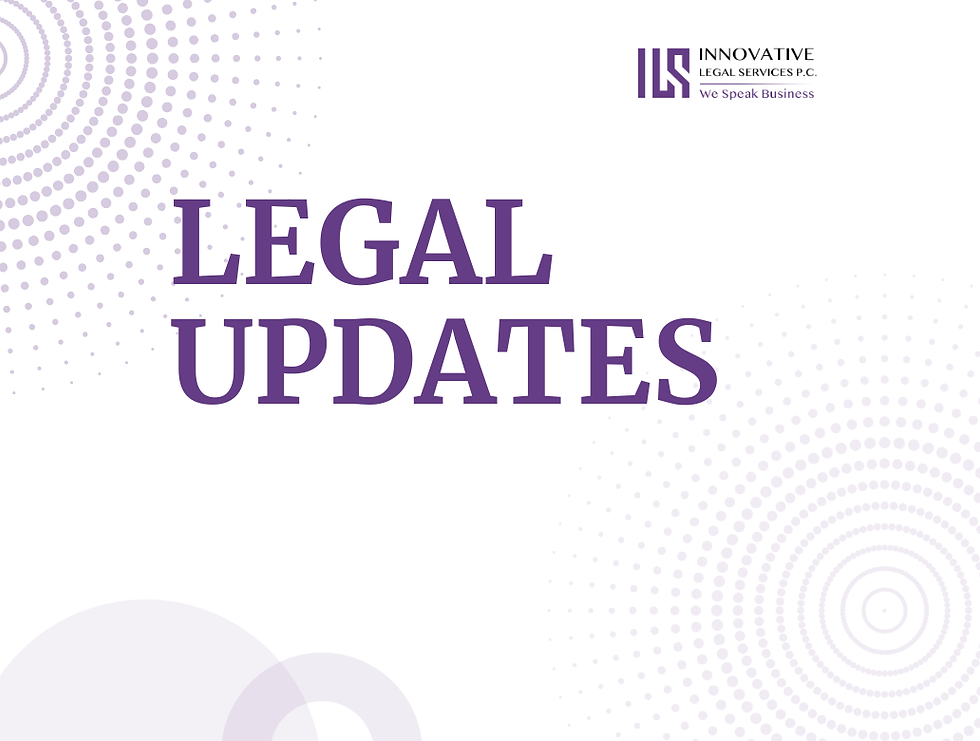Adopting the DOL’s AI Guidelines: A Strategic Framework for Employers
- Fiona Xu

- Nov 4, 2024
- 4 min read
As AI technology continues to shape the workplace, the U.S. Department of Labor (DOL) has issued updated recommendations to guide responsible AI adoption in businesses. On October 16, 2024, the DOL published Artificial Intelligence and Worker Well-Being: Principles and Best Practices for Developers and Employers, aimed at helping companies implement AI in ways that benefit both employers and employees. Though these guidelines are voluntary, they offer valuable insights for businesses seeking to integrate AI without compromising worker rights, safety, or engagement.
For more information on DOL’s AI Guidelines and their potential impact on your organization, contact our Partner, Fiona Xu, at fiona.xu@consultils.com.

Below, we break down the core principles and practical strategies companies can leverage to create a balanced approach to AI.
1. Engaging Employees Early in AI Adoption
A key aspect of the DOL’s recommendations is early engagement with employees about AI. Employers are encouraged to communicate openly with workers, especially in unionized settings, to discuss how AI systems will impact their roles. This includes prioritizing input from workers about the kinds of tasks AI will handle and ensuring that feedback mechanisms are in place. Early involvement fosters a collaborative environment where AI serves as a resource that empowers rather than alienates employees.
2. Prioritizing Ethical Standards in AI Development
AI development should be rooted in ethical standards that emphasize worker protection, civil rights, and safety. To this end, businesses are encouraged to implement practices that facilitate ongoing human oversight of AI tools and data inputs. This means creating roles for employees to continuously monitor and refine AI systems, ensuring that they meet ethical and performance standards. Establishing these checks and balances promotes transparency and accountability within AI operations.
3. Practicing Responsible Data Management
Data privacy is central to responsible AI implementation. Employers should collect and use worker data only as necessary for legitimate purposes, adhering to legal requirements for data security and privacy. Ensuring that employees are informed about how their data is used, and securing consent for data-sharing outside the organization, reinforces a commitment to privacy and compliance with growing data protection standards.
4. Building Governance Structures for Oversight
Establishing an AI governance structure is critical for ensuring consistent, responsible use of AI across an organization. The DOL suggests that employers create a dedicated oversight team to coordinate AI applications and make certain that ethical standards are applied uniformly. Training is essential for all employees involved in AI processes, from development to implementation, so that there is a clear understanding of how AI should be used in a work context. Human oversight remains vital, especially when AI systems influence significant employment decisions, like hiring or promotions.
5. Enhancing Transparency with Clear Communication
Transparency about AI’s role in the workplace is essential for maintaining employee trust. Companies should provide clear information on how AI impacts employment decisions and any monitoring practices that might be in place. Giving employees access to explanations of AI processes, along with the option to correct data related to their employment, helps ensure that AI supports rather than hinders transparency and fairness.
6. Protecting Worker Rights and Labor Standards
To prevent AI from infringing on labor rights, the DOL underscores the importance of monitoring AI’s impact on worker rights, including privacy, workplace safety, and freedom to organize. Businesses should take measures to ensure that AI applications respect legal standards for discrimination and inclusivity, particularly for job candidates and employees with disabilities. Regular evaluations of AI’s performance can help detect and address any issues that may undermine protected worker rights.
7. Using AI to Improve Job Quality and Employee Development
The DOL’s guidance encourages employers to use AI in ways that enhance, rather than replace, human jobs. For example, AI can automate repetitive tasks, allowing employees to focus on more complex and engaging work. By piloting AI tools and seeking feedback, employers can refine AI systems to support job enrichment. Training and support programs can help employees adjust to new technologies, ensuring they are prepared for the evolving workplace landscape.
Conclusion
While the DOL’s AI recommendations are advisory, they represent a forward-thinking approach that can help businesses anticipate future regulatory changes. By integrating these principles, employers can prepare for a future where AI-related compliance standards are likely to evolve. Establishing transparency, ethical standards, and strong governance now can not only protect employee rights but also build a workplace culture grounded in trust and accountability.
For more information on DOL’s AI Guidelines and their potential impact on your organization, contact our Partner, Fiona Xu, at fiona.xu@consultils.com.
Disclaimer: The materials provided on this website are for general informational purposes only and do not, and are not intended to, constitute legal advice. You should not act or refrain from acting based on any information provided here. Please consult with your own legal counsel regarding your specific situation and legal questions.

Fiona Xu, Esq. is the Partner and Head of Transactions of ILS.
She has extensive experience supporting global and high-growth technology companies on compliance and business needs. Her practice focuses on regulatory compliance across different sectors, with a focus on sector-specific regulations for artificial intelligence (AI) and medical devices. She supports multinational corporations in establishing and maintaining U.S. operations, managing legal and compliance challenges in various areas such as Privacy, Export Control, and CFIUS issues.
Email: fiona.xu@consultils.com | Phone: 626-344-8949


Comments